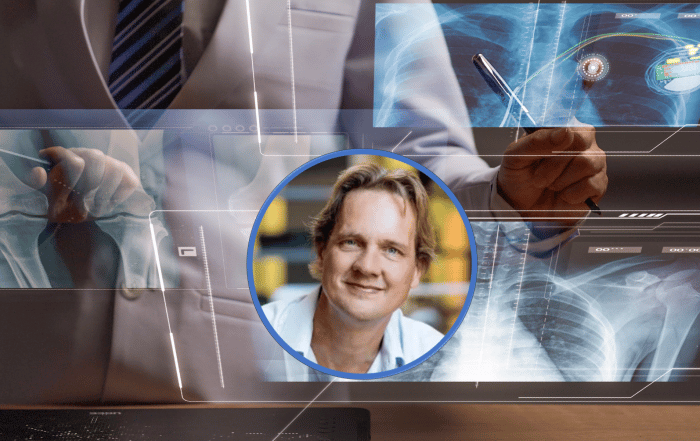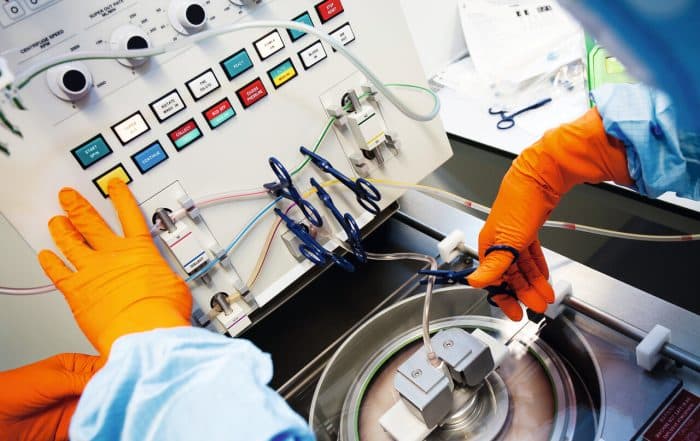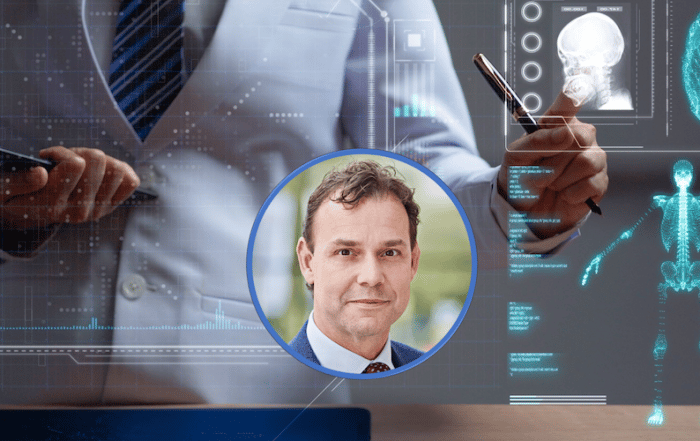Data sharing in healthcare: big promises, but also big challenges
The promise of sharing and optimising healthcare data is great. But promising projects also have major challenges. At Zorg2025, healthcare innovators share their experiences and advice. "Find alignment with the GP's work process."
Amsterdam Economic Board, ahti, Smart Health Amsterdam, Rabobank and Sigra jointly organise the Zorg2025 meetings. Health and prevention are the focus. Healthcare and welfare innovators from business, government and the scientific realm share their knowledge and experience.
“There are a lot of catchphrases and terms around data,” says Robert Thijssen of Sigra in his introduction. “There is gold shining on one side, but we also hear about the misery on the other side.” Speakers highlighted both sides during the Zorg2025 event on 6 September. Lies van Gennip talks about the Health Data Infrastructure she is working on with a consortium of eight large organisations. Marijn Vonk of Syntho talks about how synthetic data can eliminate many big challenges. And Bob Verhagen of Buurtdokters (Neighbourhood Doctors) shares his important advice for healthcare innovators who want to get into general practice.
A new infrastructure for health data
The Netherlands is a champion of digitalisation in healthcare. “But what we’re not doing well is reusing data for that care,” says Lies van Gennip. She is the quartermaster for the Health Data Infrastructure initiative (GDI) at the Amsterdam Economic Board. In that role, she sees that much is already happening, but that all initiatives have the same bottlenecks: “Sometimes it takes up to three years before an initiative can access the necessary data. That’s something we want to do something about with the GDI.”
Eight parties have committed to the GDI and provided start-up funding for it. Van Gennip: “Our goal is to arrange the governance of data in a trust, as a kind of utility with an earning power.” The focus is currently on the Amsterdam Metropolitan Area, but the GDI aligns with national and European developments. For example, with the EU proposal for a European Health Data Space.
The GDI particularly wants to learn from experiences that parties currently have with data sharing, start small, develop models from there and thus establish a good basis as a regional precursor. Van Gennip: “The real bottleneck is not in the technology, we’ll figure it out. The real problem lies in the trust among the various parties, about how they can make agreements to share data within the framework of the laws and regulations. So that’s what we’re focusing on first right now.”
Van Gennip makes the GDI concrete with two use cases that have now been started. A Covid Early Warning System (EWS), for which Municipal Health Services (GGD) and GPs share data. The model uses Stizon, a foundation in which healthcare providers share data. “The prospect of this use case is to create a generic EWS for a range of diseases.” The other use case is the AAN project, in which healthcare institutions share data from melanoma and crc patients on how therapies work. In both use cases, the General Data Protection Regulation is still a big hurdle, also because lawyers all have different interpretations.
“There is unfortunately no gold standard yet for what is and is not allowed,” says Van Gennip. “That’s why the core of the GDI is that we’re going to build trust so that we can resolve the differences in interpretation. And so that regulators and the government, lawyers, institutions, healthcare providers and patients will eventually trust us too.”
True anonymity thanks to synthetic data
As Lies van Gennip also said, privacy is a major stumbling block in implementing data-driven healthcare innovations. Using synthetic data can be a solution for this. Marijn Vonk, co-founder of startup Syntho shows how this is done and explains that the Dutch Data Protection Authority recently started advising this as well.
Many organisations and researchers anonymise data, but the problem with that is that it usually doesn’t lead to completely anonymous data, Vonk explains. “That data can often still be traced back to a person and, in addition, it is time-consuming and usually manual work. That’s why we started looking at a new solution: AI-generated synthetic data. That data can never be traced back one-to-one to a person.”
Syntho offers a self-service platform within which users can convert data to synthetic data in their own secure environment. Users can then do analysis on that data. Independent research by SAS, a provider of advanced analytics software, shows that similar analyses can be done with this new dataset that produce nearly the same results. Vonk: “Because you’re using AI, it’s completely automatic. That’s much easier and faster than manually anonymizing data and also scalable.”
Smart data deployment by Buurtdokters
What does it take for a healthcare innovation for a general practice to succeed? That’s what Bob Verhagen, the founder of Buurtdokters (Neighbourhood Doctors), tells us. Buurtdokters are taking over practices along with the new generation of family physicians. In doing so, Buurtdokters provides the overhead so that the family physician can focus on providing healthcare. Digitalisation plays a big role in this: for example, patients who want it can get a digital consultation. Says Verhagen, “My dream is that we can provide the right GP care, including access to cost-effective care innovations.”
And the latter is often not easy. “Innovations in healthcare often have great promise, but then cannot be implemented in a practice. For example, due to scale and implementation problems. But many innovations also do not match how things work in practice. For example, because data is not stored in the same way. GP practices are often organized too small to change big things.”
His advice is therefore: make sure you come up with innovations that save time and energy and fit in with the GP’s work processes. Verhagen: “I want to invite innovative healthcare services to tap into that process. Because if you first start developing something for two years and only then knock on a GP’s door, you will still fail.”
The Amsterdam Economic Board organizes Zorg2025 meetings four times a year, together with Smart Health Amsterdam, Rabobank Amsterdam, care partnership Sigra and Ahti. Would you like to attend a meeting? You can! Check out our events When the next meetings will be at café restaurant Dauphine in Amsterdam.
9 September 2022
Read more about
Contact us
Want to keep up to date?
Get the best regional news and events (in Dutch) via the Board Update newsletter
Share this news
Want to keep informed?
Follow us daily on LinkedIn and sign up for the Board Update newsletter.
Read more
- On 14 and 15 October, board members of the Amsterdam Economic Board convened for ...
- Focusing more on women in health care innovation and research will have ...
- What is the Amsterdam Metropolitan Area’s position on critical raw materials? ...




